Another lawsuit challenges Hammonds grazing permit
Published 3:00 pm Friday, February 26, 2021

- Hammond Ranches was recently re-authorized to use grazing allotments in Eastern Oregon, but an environmental lawsuit seeks to overturn that decision.
SALEM — Environmentalists have asked a federal judge to again cancel the grazing permit for Oregon’s Hammond family, claiming its restoration violated administrative, environmental and land management laws.
In January, the U.S. Interior Department reauthorized the Hammonds to graze cattle on four public land allotments totaling 26,400 acres, partly due to the family’s historic use and proximity to the federal property.
Trending
Steven Hammond, who operates the ranch, and his father, Dwight, originally lost permission to graze the allotments near Diamond in 2014 when the government refused to renew their permit after they were criminally charged with setting fires to rangelands.
The Hammonds were convicted and completed their initial prison terms, then ordered back behind bars after the 9th U.S. Circuit Court of Appeals ruled they had to serve five-year mandatory minimum sentences for arson.
Their return to prison in early 2016 sparked protests that culminated in a monthlong stand-off with federal agents at the Malheur National Wildlife that attracted national attention.
The ranchers were released early in 2018 after receiving a full pardon from former President Donald Trump, which prompted the Interior Department to renew the ranchers’ grazing permit the following year due to “changed circumstances.”
However, environmental groups convinced a federal judge to reverse that decision in 2019 because the grazing permit was renewed contrary to regulations.
The Interior Department then opened up the grazing allotments to applications from other ranchers, but ultimately decided to issue a new permit to the Hammond family earlier this year.
Trending
The Western Watersheds Project, Oregon Natural Desert Association, Wildearth Guardians and Center for Biological Diversity have now filed another lawsuit seeking to rescind the grazing permit’s most recent approval.
The environmental plaintiffs argue the federal government’s decision involved “rushed, opaque, and highly unusual public processes” that were “tainted by political influence and are not the product of reasoned, lawful decision-making,” the complaint said.
According to the complaint, the federal government approved the grazing permit “without opportunities for public participation required by law” and wrongly determined the Hammonds were more qualified than other applicants.
The decision also didn’t comply with land use protections for the sage grouse and with a statute aimed at conserving the “long term ecological integrity” of Steens Mountain in Eastern Oregon, the complaint said.
Alan Schroeder, attorney for the Hammonds, referred questions about the lawsuit to Steven Hammond, who wasn’t available for comment.









